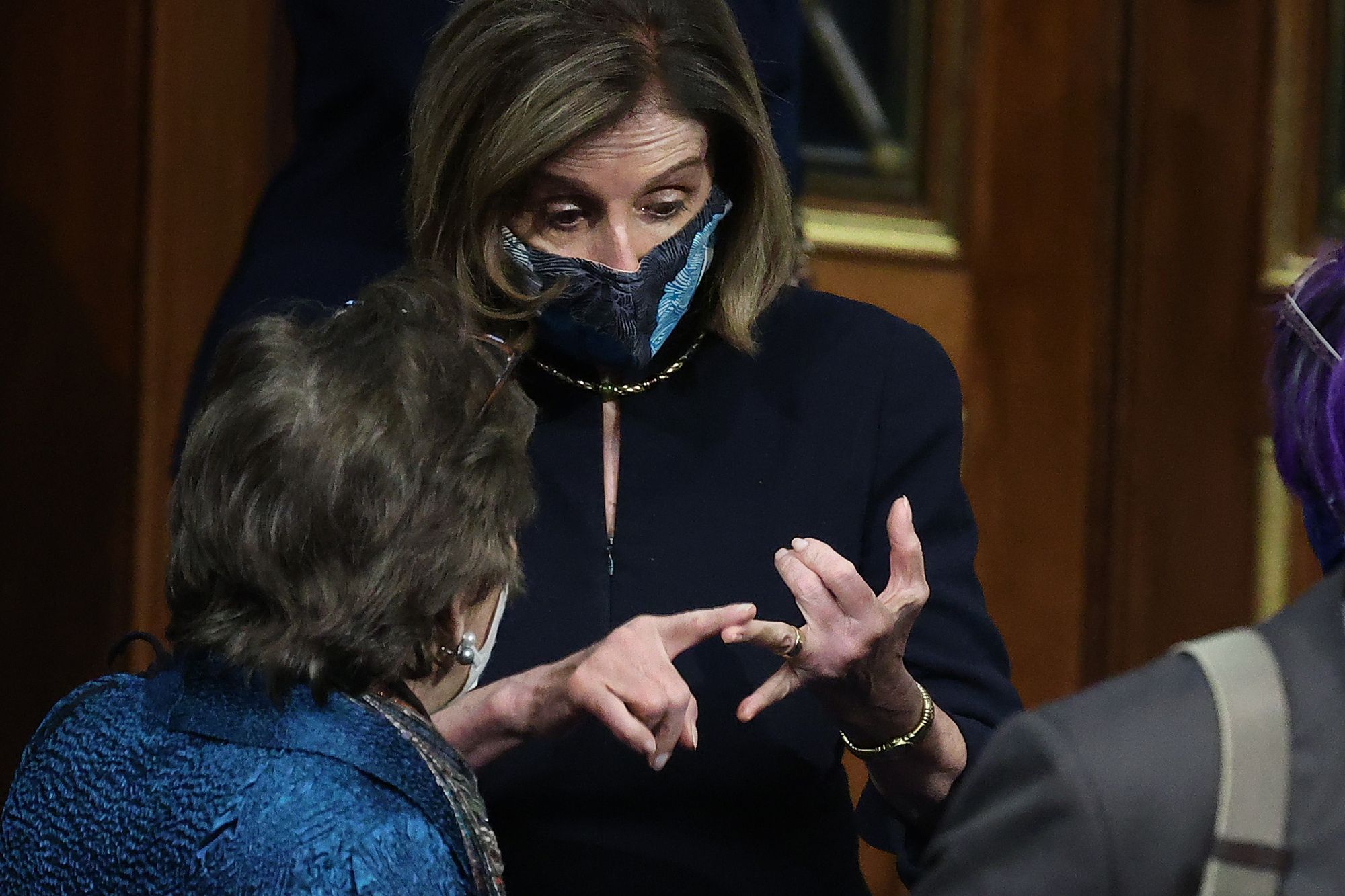The House of Representatives voted 232 to 197 Wednesday afternoon to impeach Donald Trump a second time on one charge of "inciting an insurrection." Now the hope is that the Senate will step up and prevent our dangerous douchebag of a president from ever holding federal office again.
Just one year ago, the Senate was holding a historic trial following two articles of impeachment being sent by the House, with all signs pointing to acquittal as all but one lone Republican, Mitt Romney, stood by Trump in deference to their constituents who still liked him. With the president's approval rating now at 34 percent, maybe the needed 17 senators will finally grow a spine and see their role in enabling Trump as a possible stain on their legacy. But maybe not!
10 Republicans in the House managed to do just that, as the New York Times reports, differentiating this impeachment from the first one, which was all party-line votes. The Republicans who split from their colleagues and the leader of their party (for the next seven days) were Representatives Liz Cheney of Wyoming, Jaime Herrera Beutler of Washington, John Katko of New York, Adam Kinzinger of Illinois, Fred Upton of Michigan, Dan Newhouse of Washington, Peter Meijer of Michigan; Anthony Gonzalez of Ohio, David Valadao of California, and Tom Rice of South Carolina.
Among the House Members casting votes in this swift impeachment were a significant number of congresspeople who just arrived on the job last week, and for whom an impeachment was their first opportunity to make a 30-second speech on the House floor. And among the nearly 200 Republicans who voted against the impeachment, the arguments for their Nay votes fell into two categories: insisting Trump did nothing wrong, and conceding that Trump did something wrong but nothing worthy of this fast-track impeachment. As NYT Congressional correspondent Catie Edmondson said during live analysis of the impeachment hearing, it's likely that Republicans in the Senate will either fall into the latter category, or they will fall in the category of those who want to see him convicted.
House Speaker and SF Rep Nancy Pelosi issued a statement saying, "The president must be impeached and I believe the president must be convicted by the Senate, a constitutional remedy that will ensure that the republic will be safe from this man who is so resolutely determined to tear down the things that we hold dear and that hold us together. It gives me no pleasure to say this. It breaks my heart."

Other lawmakers made more pointed statements, like Louisiana Democrat Cedric Richmond who said, "Simply put, we told you so," and New York Democrat Hakeem Jeffries, who said, "Donald Trump is a living, breathing impeachable offense. It is what it is."
Senate Republican Leader Mitch McConnell issued a statement Wednesday saying that while he supported the impeachment push in the House, "I have not made a final decision on how I will vote, and I intend to listen to the legal arguments when they are presented to the Senate."
McConnell has said he will not call the Senate back into session until Tuesday, January 19, which makes the prospect of a trial before Biden's inauguration all but impossible. And critics are already pointing to the idea that McConnell likely wants to make this second impeachment all Biden's and Majority Leader Chuck Schumer's problem.
There is precedent, by the way, for Senate trials that come after a person has left office, but not for a president. The impeachments of Senator William Blount in 1797 and Secretary of War William Belknap in 1876 both happened after the men were no longer in their jobs, but both were acquitted in the Senate. There is no precedent for a Senate conviction that prevents a president from holding future office, and the Times notes that the issue could end up before the Supreme Court.
At stake this time is not removing Trump from office, obviously, but preventing him from holding office again — and, some Republicans likely hope, ending the era in which he has dominated the party and the national conversation by being an uncompromising, narcissistic, TV president.
Trump has made no apology for the speech he gave last Wednesday that most Americans heard as inciting a riot, and on which this impeachment rests. But he issued a statement Wednesday ahead of the impeachment proceeding that House Republicans read from the floor saying, "There must be no violence, no lawbreaking and no vandalism of any kind. That is not what I stand for, and it is not what America stands for. I call on all Americans to help ease tensions and calm tempers."
Calm tempers... HA. You think he wrote that? Has anything he ever tweeted in his life said anything remotely like "calm your tempers"?
Still, reporters and House Republicans who voted in favor of impeachment had to breathe some sigh of relief today that Trump didn't have Twitter to mouth off on all day long while he was no doubt watching some of this.
And will people really still be talking about Trump in two years when these people come up for reelection? God I hope not.
Photo by Stefani Reynolds/Getty Images

